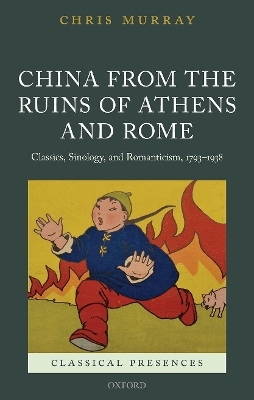
China from the Ruins of Athens and Rome
Oxford University Press (Verlag)
978-0-19-876701-5 (ISBN)
Fascinated and often baffled by China, Anglophone writers turned to classics for answers. In poetry, essays, and travel narratives, ancient Greece and Rome lent interpretative paradigms and narrative shape to Britain's information on the Middle Kingdom. While memoirists of the diplomatic missions in 1793 and 1816 used classical ideas to introduce Chinese concepts, Roman history held ominous precedents for Sino-British relations according to Edward Gibbon and Samuel Taylor Coleridge. John Keats illuminated how peculiar such contemporary processes of Orientalist knowledge-formation were. In Britain, popular opinion on Chinese culture wavered during the nineteenth century, as Charles Lamb and Joanna Baillie demonstrated in ekphrastic responses to chinoiserie. A former reverence for China yielded gradually to hostility, and the classical inheritance informed a national identity-crisis over whether Britain's treatment of China was civilized or barbaric.
Amidst this uncertainty, the melancholy conclusion to Virgil's Aeneid became the master-text for discussion of British conduct at the Summer Palace in 1860. Yet if Rome was to be the model for the British Empire, Tennyson, Sara Coleridge, and Thomas de Quincey found closer analogues for the Opium Wars in Greek tragedy and Homeric epic. Meanwhile, Sinology advanced considerably during the Victorian age. Britain broadened its horizons by interrogating the cultural past anew as it turned to Asia; Anglophone readers were cosmopolitans in time as well as space, aggregating knowledge of Periclean Athens, imperial Rome, and many other polities in their encounters with Qing Dynasty China.
Chris Murray is Lecturer in Literary Studies at Monash University. He is the author of Tragic Coleridge (2013), and Crippled Immortals (2018) -- a memoir about Zen martial-arts masters -- and has been elected a Fellow of the Royal Asiatic Society.
1: A Classical Cathay and a Real China
2: 'Ancestral Voices Prophesying War': Samuel Taylor Coleridge, Edward Gibbon, and the Warnings of History
3: The White Snake, Apollonius of Tyana, and John Keats's Lamia
4: Charles Lamb, Roast Pork, and Willow Crockery
5: Better fifty years of Europe than a cycle of Cathay': British Progress, the Opium Trade, and Tennyson's Retrospection
6: A Greek Tragedy in China: Thomas de Quincey's Opium Wars Journalism
7: 'From those flames no light': The Summer Palace in 1860 and Beyond
8: Coda: 'All things fall and are built again': Yeats's Daoist Optimism and the Fall of the Qing Empire
Appendix: Sara Coleridge, 'Tennyson's "Lotos-Eaters" with a New Conclusion'
| Erscheinungsdatum | 25.09.2020 |
|---|---|
| Reihe/Serie | Classical Presences |
| Verlagsort | Oxford |
| Sprache | englisch |
| Maße | 23 x 148 mm |
| Gewicht | 22 g |
| Themenwelt | Geschichte ► Allgemeine Geschichte ► Neuzeit (bis 1918) |
| Geisteswissenschaften ► Geschichte ► Regional- / Ländergeschichte | |
| Geisteswissenschaften ► Sprach- / Literaturwissenschaft ► Anglistik / Amerikanistik | |
| Geisteswissenschaften ► Sprach- / Literaturwissenschaft ► Literaturgeschichte | |
| Geisteswissenschaften ► Sprach- / Literaturwissenschaft ► Literaturwissenschaft | |
| Sozialwissenschaften | |
| ISBN-10 | 0-19-876701-3 / 0198767013 |
| ISBN-13 | 978-0-19-876701-5 / 9780198767015 |
| Zustand | Neuware |
| Informationen gemäß Produktsicherheitsverordnung (GPSR) | |
| Haben Sie eine Frage zum Produkt? |
aus dem Bereich


